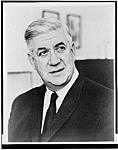Posted on October 28, 2001
Revive The Line-Item Veto
...and this time, do it right
by
Daniel Clark
On February 6, 1995, the new Republican majority in the House of Representatives passed the Line Item Veto Act, which would later be signed into law by President Clinton. Speaker of the House Newt Gingrich saw to it that the vote would be taken on that particular day, so that he could present it as a gift to Ronald Reagan on his 84th birthday.

If this gift had come with a receipt, Reagan would probably have returned it, because this wasn't what he'd wanted at all. What he had suggested -- both in his 1984 State of the Union Address, and in one of his radio addresses from the mid-seventies (the script from which is reprinted in the book Reagan, In His Own Hand) -- was that a federal line-item veto should be instituted by way of a constitutional amendment. What Gingrich gave him instead was a simple statutory law.
The reason he did that is plain enough. The amendment process is necessarily difficult. In order to take the extraordinary measure of amending the Constitution, two-thirds majorities in both the House and Senate are needed before an amendment can be referred to the states, where it must be ratified by at least three-fourths of them. Most proposed amendments are negotiated to include sunset clauses, which say they must be ratified within a finite amount of time, or else they are nullified. Congressional Republicans figured they didn't have to go through all that trouble, with all those opportunities for failure, because they happened to be in agreement on this issue with the Democrat president, Bill Clinton.
By voting on a line-item veto statute, Gingrich needed only to scare up a simply majority of votes in each house of Congress, instead of two-thirds. Having Clinton's support, the bill needed the ratification of only a single man, not that of the legislatures of 38 states. At the time, it must have seemed like a simple solution to what had looked like a daunting and tedious task.
Inevitably, President Clinton exercised this newly-acquired power, and the potential beneficiaries of some of the items he lined out decided to sue. In Clinton v. City of New York, decided on June 25, 1998, the Supreme Court struck down the line-item veto on a 6-3 vote, the majority arguing that it violated the Constitution's "presentment clause," which it certainly did.
The presentment clause can be found in Article I Section 7 of the Constitution, which reads in part, "Every bill which shall have passed the House of Representatives and the Senate, shall, before it become a Law, be presented to the President of the United States; If he approve he shall sign it, but if not he shall return it, with his Objections to that House in which it shall have originated, who shall enter the Objections at large on their Journal, and proceed to reconsider it."

Clearly, this clause grants the president the authority to either sign or veto an entire bill; it does not contemplate the possibility of vetoing only selected parts of a bill. Some will argue that the framers of the Constitution did not consider that possibility because they didn't envision omnibus spending bills, or riders attached to unrelated legislation, and that if they were alive today, most of them would be all for giving the president some recourse to combat abuses of power by the legislature. Be that as it may, it does not alter the language of the Constitution, which is what must be done in order to allow a bill to be dissected as it would be by a line-item veto.
That's why Reagan had suggested a constitutional amendment in the first place. The partial-posteriored approach that Gingrich and Clinton had taken was doomed to failure, just as long as the Supreme Court was willing to uphold the Constitution. Granted, sometimes that seems like a long shot, but our elected officials should have enough respect for the Constitution that they wouldn't try to circumvent it, even if they were a hundred percent sure they could get away with it.
As it happened, the Court's ruling in that case took the form of a scolding to the creators of this law, for not having known better. The majority opinion, written by Justice John Paul Stevens, concluded, "If there is to be a new procedure in which the President will play a different role, such change must come through the Article V amendment procedures."
To say the least, Congress has been slow to heed this advice. The initial reaction was to take the ruling not as a temporary setback, but as a total and ultimate defeat. By taking a short cut, Gingrich had short-circuited the movement toward a real line-item veto.
Perhaps the most aggravating aspect of the way this debate has unfolded is that it has allowed pork-barrel spending king and former KKK recruiter Sen. Robert Byrd (D,WV) to pose as a stalwart defender of the Constitution, simply by defending his own belief in his right to our money. "The wisdom of the Framers has once again prevailed," he rejoiced after the Court's decision, "and the slow undoing of the people's liberties has been halted, at least for now."
Oh ... so when Sen. Byrd spends our money to subsidize a documentary on Appalachia, build a National Center for Cool and Cold Water Aquaculture, or dedicate the Robert C. Byrd visitors' center at Harper's Ferry, he is doing it for us? Please! If he's really so dedicated to preserving the Constitution, maybe he can show us just where in Article I Section 8 Congress is given the authority to involve itself in such projects in the first place.
It wasn't until March 23, 2000 that congressional supporters of the line-item veto made any serious effort to achieve their goal in the constitutionally proper manner. On that day, hearings were held in the House of Representatives on an amendment which had been drafted by Representatives Phil English (R, Pa.) and John Baldacci (D, Maine). The date of those hearings is itself discouraging, since it's now more than a year and a half later, and nothing further has been done.

That might be just as well, actually, if you look at the text of the proposed amendment, which reads: "The President may disapprove any item of appropriation in any bill. If any bill is approved by the President, any item of appropriation contained therein which is not disapproved shall become law. The President shall return with his objections any item of appropriation disapproved to the House in which the bill containing such item originated. The Congress may, in the manner prescribed under section 7 of article I for bills disapproved by the President, reconsider any item disapproved under this article."
That may sound perfectly logical to those of us outside the legislative process, but anyone serving in Congress should have spotted its fatal flaw immediately. One of the hearings' witnesses did. Louis Fisher of the Library of Congress' Congressional Research Service pointed out that, unlike the overturned line-item veto statute, the amendment being discussed would not have actually allowed the president to veto line-items.
"[W]hen you look at going after appropriations, the Line Item Veto Act said the President can veto discretionary budget authority," he explained. "The statute then defined discretionary budget authority in such a way that the President could go into report language, which is what President Clinton did. So you can see that in the statute, the President was not restricted to what was in front of him in the bill. He could go into where the items are. They are in the committee reports and the conference reports. So one of the odd things about a constitutional amendment is that it would allow a President to veto items, but Congress doesn't put items in bills and you know that. You don't put items in bills. You put items in reports."
What makes these reports elusive to the president is that they are not legally binding documents; they are mere guidelines indicating how Congress would like appropriated money to be spent. The various bureaus and departments of government generally adhere to those guidelines, because they are beholden to Congress for funds on an annual basis. Neither house of Congress is actually legally bound to produce committee reports, so the president can't very well have a constitutional role in revising them.
Any line-item veto amendment has got to include a requirement for Congress to itemize appropriation bills in the language of those bills themselves, as legislatures are bound by law to do in many states. Once that is established constitutionally, then the detail in which those itemizations must be made could be determined by statute. Without these requirements, the English-Baldacci proposal is a hollow, symbolic gesture. One would have to deduce that to have been its intention from the start, considering the enormity of that built-in loophole.
Opponents of a line-item veto wail that it would throw our federal separation of powers out of balance, by elevating the power of the presidency to a level approaching monarchy. That's far from realistic, and they know it. The legislature would have the same power to override the veto of a line-item as it does the veto of an entire bill. If there's enough support in Congress to override a presidential veto of an entire appropriations bill, then a veto of any line-item which is essential to that bill would likely be overridden as well.
The vetoes that would stand would be mostly related to isolated pet projects, the kind that serve little purpose other than to maintain the advantage of incumbency for a particular congressman, by greasing the palms of voters in his district. The power of the legislative body as a whole would not be diluted by this, but the power of individual legislators definitely would be. This would not create any sort of constitutional crisis. It would, however, present lots of career politicians with the possibility of having to get a job in the private sector someday.
Sympathetic historians assume the purest of motives behind former Speaker Tip O'Neill's philosophy that "all politics is local," but for the most powerful man in the federal legislature to hold such a view was an abrogation of his duty to the nation.

It was O'Neill's belief that local matters, and not issues of national importance, decide elections. This may or may not be true, and in his case, it certainly seems to have been, since he was elected to seventeen terms in the House of Representatives. What that said about his priorities, however, was an abomination. The U.S. Congress is a federal legislative body, which is empowered with awesome national and international responsibilities, including declarations of war. Those things are of secondary importance, though, if each politician's personal ambition sets the agenda. What really counts, according to this way of thinking, is that make-work construction project for the boys back home, because that would be the issue that the voters in that district would remember on Election Day ... and nothing is higher in value to a career politician than reelection.
In 1994, Gingrich steered Congress back toward its most important obligations when he succeeded in nationalizing the congressional elections, by bringing issues of national security, fiscal responsibility, welfare reform, and governmental structural reform to the forefront of national debate. What he was unable to do was to then nationalize the role of federal elected officials themselves. The "all politics is local" philosophy has lived on, in appropriations bills that are every bit as larded down with pork-barrel spending as they were when the Democrats controlled both houses of Congress.
It does not have to continue this way. If the Constitution were amended to include a real line-item veto, it would be harder for an individual congressman to deliver the goods from taxpayers in other states and districts to those in his own. If that congressman is not able to garner federal subsidies for, say, a local museum, then the employees of that museum will have to decide who to vote for based on some criterion other than mutual back-scratching. Suddenly, the congressman's positions on national issues would matter.
A line-item veto would obstruct the deal-making within Congress as well. There is now a tacit agreement by which congressmen approve each other's pork-barrel projects, so that none of them will have his own spending rejected. If the president were able to cross out selected items, that would enter a tone of discord into this harmonious relationship.
If President Bush had a line-item veto, Democrats would know that their spending items would be more likely to be vetoed, and would therefore realize that an agreement with Republicans to support each others' projects would be a bad deal for them. If they doubted that their items would be signed into law, they would try to ensure that their colleagues' items wouldn't be, either. The ensuing gridlock would mean that fewer, not more, additional spending items would need to be written into a bill in order for it to pass. In this way, the threat of using a line-item veto would already have cut wasteful spending from an appropriations bill before it even arrived on the president's desk.
That's what Ronald Reagan wanted. Whether it's what is wanted by congressional Republicans, who won control of the House by promising exactly that kind of reform, now appears doubtful. It's as if those energetic young reformers who swept into office in '94 had never dreamt that, one day, they would become incumbents.
The Shinbone: The Frontier of the Free Press
Mailbag . Issue Index . Politimals